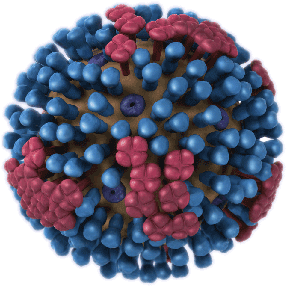
| Sept. 2018 | |||||||||||
| Top stories | |||||||||||
| In the news | |||||||||||
| Photos | |||||||||||
| Contact us | |||||||||||
| Archive | |||||||||||
|
SHL issues guidance for flu surveillance testing |
Sept. 25, 2018 --
The State Hygienic Laboratory this month issued guidance for influenza surveillance testing during the 2018-2019 flu season. This guidance helps clinical laboratories collect and send specimens to SHL for molecular testing.
SHL tracks the incidence of influenza in the state as part of the Iowa Influenza Surveillance Network (IISN). The surveillance program also documents influenza-like illnesses, hospitalizations and deaths for the Iowa Department of Public Health’s Center for Acute Disease Epidemiology.
 Influenza virus
Influenza virus
The IISN is comprised of health care providers, hospitals, schools, childcare centers, businesses and long-term care facilities that work closely with SHL to compile this statistical information.
Details about the number of flu, respiratory and respiratory syncytial virus cases in Iowa are available in the IDPH Weekly Iowa Flu Reports. Reports are updated weekly during the flu season from the first week of October through the last week of May, and monthly from June through September.
SHL is the primary Iowa lab for confirmatory influenza testing of specimens submitted by hospitals, and reference and clinical labs. It reports the number of tests performed, and the type and sub-type of positive tests to the influenza surveillance network several times every week. The laboratory also surveys clinical and reference labs on a weekly basis for the number of rapid-antigen tests performed, and the number of positive influenza and positive non-influenza virus tests.
The CDC recommends that everyone more than 6 months old should receive the flu vaccine, preferably by the end of October. It may take up to two weeks after vaccination for the body to achieve protection from flu viruses.
Influenza is a respiratory illness caused by viruses. The flu comes on suddenly, and symptoms may include fever, headache, tiredness, cough, sore throat, nasal congestion and body aches. The illness typically lasts two to seven days. A “stomach bug” that causes diarrhea and vomiting is not caused by the influenza virus, but usually by norovirus. The flu vaccine does not provide protection against this illness.